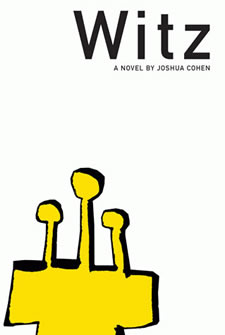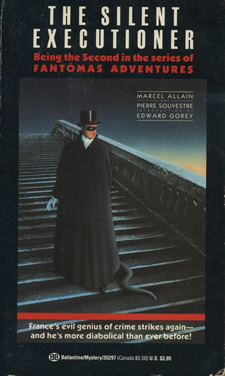 Joshua Cohen
Joshua Cohen
Witz
(Dalkey Archive, 2010)
Talking to someone reading Infinite Jest for the first time a few months back, I found myself remembering what it was like reading that book the summer of 1996: how it felt like one book might, just might, contain all the secrets of the universe. It’s a sensation I found again and again: in Gravity’s Rainbow, The Recognitions, back in Moby-Dick, Ulysses, Under the Volcano, even, falteringly, in something like Underworld; this list could go on. All of these were formative books for me: the big bulky masterpiece, which I read with the promise of gnostic enlightenment, an enlightenment that the preterite world couldn’t see or wouldn’t pay attention to. If they would only listen to this, I found myself thinking, and I forced these books on my friends, imagining that they would like to be enlightened.
I don’t find myself reading as many big books now, though a couple of them sit balefully on the shelves, awaiting attention: Heimito von Doderer’s The Demons, Marguerite Young’s Miss Macintosh, My Darling, Against the Day. (For the past year, I’ve been reading at Finnegans Wake, but that seems another case entirely.) Instead, I tend to find myself reaching for shorter and shorter books, things I know I’ll get down quickly: right now Charles Flandrau’s Viva Mexico, the new Harry Mathews, Diary of a Nobody, Libyan guidebooks. This choice is partially one of time management: there are too many books, old and new, that I feel the need to read, more being published every week; and I have a finite amount of time to read these books in. This situation is one that every reader finds to be the case now; we are inundated with books. A long book is more of a gamble for a reader who tends to finish what he starts. But beyond this increasingly universal problem of logistics, I find myself with another problem, perhaps related: increasingly finding myself doubting the revelatory power of the encyclopedic. To an extent, this comes with having read a lot of very good books; to another extent, it’s a problem connected with the Internet, with the power of instantly having at your fingertips almost anything. It’s difficult for the individual voice to successfully counter the voice of the crowd, and I think the encyclopedia novel especially suffers from this: at the time, it was edifying to learn about the Herero genocide in Gravity’s Rainbow or Vaucanson’s duck in Mason & Dixon, for example, but it’s now very easy to go to Wikipedia and learn about these things in nauseating detail. One of the reasons we used to turn to this sort of book – revealing what had been obscure – has been superseded by the Internet, in the same way that newspapers no longer break news.
(I’m not trying to suggest some sort of inner abdication of the long novel for the short story, though it might sound that way; I’ve always generally preferred the novel to the short story. Nor am I trying to suggest that fact should replace fiction; I still think lies are more interesting than truth.)
At the same time, of course, I find it increasingly difficult to get exciting about reading anything new when I could be re-reading Proust or reading The Death of Virgil for the first time: there’s a much higher chance that I’ll get something out of Broch than I will if I’m reading the novel du jour. At one point, all the smart people that I knew would have been talking about how dumb the latest Michiko Kakutani review is; I still know plenty of smart people, but they’re much more liable to be talking about whatever particular thing it is that they’re interested in at the moment than in any common literary touchstone. Those up to date with the books of the moment generally don’t have much to say about them that I find useful past what on the promo sheets. The margins are much wider than they once were; “literary fiction” increasingly seems a marketing construct, one focus group out of any number of possibilities.
This preamble is merely to suggest the state of mind in which I found myself approaching Joshua Cohen’s Witz – a big book, dense and unyielding – with the question of why one might write a big novel now. I found Cohen’s two earlier novels interesting; with this one, however, he’s clearly aiming at something very different: there’s a polemic propping up this novel. This is a book I’ve put off reading for a while; my copy’s been unread in Illinois, California, Virginia, Massachusetts, Rhode Island, spent time under the seats of countless movie theaters, had a great deal of coffee spilled upon it. This post has been in the draft queue for a while.
* * * * *
That said: eventually one gets around to finishing things, and now I have read this book. Caveats need to be made about my incapacity to talk about this book: first, I would be remiss if I didn’t note that Mr. Cohen has becomes something of a social acquaintance since I started reading his book, and at his request I wrote him a piece for an issue of a journal he’s editing; take that as you will. Separately, it should also be noted that I’m not Jewish: I hail from a town where the only Jewish family only bothered to point out that they were Jewish after they’d left. I have spent a great deal of time over the past fifteen years with Jews, a number of whom have been disappointed when it eventually came out that I wasn’t Jewish; but there you go. This is a book mostly about Jewishness; I can read with the Internet as a crib, but I’m essentially a tourist, and I’m liable to misread.
To start with the obvious: this is a big book in American tradition of the bookish big books. Near the beginning, the reader is immediately reminded of Gravity’s Rainbow, and later one can see pieces of V. poking through. Tristram Shandy is here, of course. The everlasting Xmas section reminds me of Ishmael Reed’s The Terrible Twos in tone. The Polandland section near the end seems reminiscent of George Saunders when he was interesting; but really it’s the logical extension of Stanley Elkin’s The Magic Kingdom. Elkin presides over the book as something of a tutelary spirit; it’s hard to imagine another writer capturing his voice better than Cohen does. Kafka’s here, of course, though pointedly not by name; the Kafka here is the weird maximalist Kafka of Orson Welles’s Americanized Trial, simultaneously gigantic and claustrophobic. Or the sword that the Statue of Liberty holds aloft at the beginning of Amerika, ready to strike Ellis Island. The Barthelme of The Dead Father is here; so is Philip Roth (The Breast). Even older dead white fathers are here as well: the Bible is a tangible presence, not only the Torah (in the first half) but also the New Testament (the second).
But the Bible, like the big books, suggest a plethora of voices; and that is not exactly what this is. Until a few hundred pages from the end, this is a narrative largely told in a single voice. Not that this is necessarily a limitation: Cohen’s voice is one of the most compelling features of his fiction, an odd mixture of distinctly oral rhythm and literate diction that is entirely his own. A sentence at random from p. 268:
A scattering of vases with even their cracks chipped, their fill a handling of left umbrellas, corrupt caducei.
C sounds skitter through this sentences, modulated with vs in the first half, ls in the second, ths and ds serving as mortar. Has anyone ever said the word caducei aloud? It’s a distinct voice: but it’s this voice which overwhelms the book, without the interruption of quotation marks or even Joycean tirets. Witz isn’t as suffocatingly Bernhardian as Cadenza for the Schneidermann Violin Concerto was; but it still requires the reader’s submission to that voice. This is a book to be read for its linguistic flights: it’s not as ingeniously plotted as, say, a Pynchon novel. Though the plotting is significantly more complex than Cohen’s previous novels, it’s not a selling point. I’ve said before that maybe Cohen should be writing poetry; I stand by that, though I am curious to see where he can go with fiction. The voices are modulated towards the end of the book: this is a book that improves as it progresses.
This is, at least in a sense, a book of eschatology. (A fine thesis could be written comparing and contrasting this book to the Left Behind series: this is left as an exercise for a reader who has the stomach for those books, which have an uncomfortable amount to say about where this country is headed.) But the end times depicted here are metaphorical, as, perhaps, end times always are:
But before our loss can be massed, given one face and voice, any name representation, an inviolate symbol – we’re asking you, wait up, langsam just a moment, will you, shtum: we all must stand ourselves, alive, aware, out on the far ice to reflect above the tide. Namely, that it’s the destiny of every individual, of even the symbol, even the ultimate, to think their time the end, to think their world the last – and this especially today, especially fastdeadly, with everything In the beginning again at the already begun, history eternally returning as always, as eternally as ever but rather quickly, evermore and more quickly now, with a precipitate urgency, an Apocalyptic insistence. Now the time in which you live the time to end all times and Time; now the Never again. In mourning, standing atop the furthest spur of frost above the deep, they mourn themselves, a little soon: their failure, their ill luck, the ruinous stars above with their frustrated mazel. It’s understood, which means it’s itself mourned, our knowing hope, our dreaming: howe we can’t all be prophets, we can’t all be priests, we can’t all be kinds; that despite what the scholars once believed, there’s only one Moses; that despite what the sages once bowed down to, there’s only our God; thinking, too, if everyone’s their own Messiah, what’s that worth, what’s in it for me. Better to unify, best to hold One indivisible. Nowadays, there’s no why to wonder who, admit it, who’ll make it, whose testimony, whose witness – that’s been long worked out and over, it’s suspected; already taken care of, chosen long before any of us were ever born to live down any death. A statement is forthcoming. (p. 306)
I worry, of course, that I’m not Jewish enough to fully appreciate this book: there’s something there, clearly, and I can get some of it, but I know that I’m not quite the audience for this book, as I don’t know enough to give it the reading it deserves. The book this might be the most similar to is a very different one, James McCourt’s Now Voyagers, from 2007: I stand outside that fantastically intricate book about New York’s largely vanished gay opera world in the same way that I am outside of this book’s Jewishness. In both, I can sense that I’m necessarily missing something. It’s doubly frustrating knowing how small the audiences are for books like this even were they not about a minority culture. Witz is a book about the disappearance of a certain sort of culture: Jewishness, here, is only really appreciated after it’s gone, which is a misguided project. Reading this book, I found myself wondering if book culture could be substituted in for Jewishness: this is a book about loss, mourning a literate world. The end of a section:
B spits on a finger to erase, a clean slate, saliva daubed with blood. A thumbprint’s trace. Upside-down, it doesn’t matter . . . I will write myself. (p. 564)
B is of course Benjamin Israelien, the last Jew, the novel’s protagonist; it’s hard to tell exactly who the I is: perhaps Israelien, perhaps the generally third-person narrator, perhaps Cohen himself identifying with Israelien’s lot. Whoever is writing, however, is writing for an audience that is no longer actually Jewish even though it might be pretending to be Jewish; just as the novelist writes for a world where the novel has lost its audience (save the masses of other would-be novelists) and seems increasingly irrelevant as a unit of culture. Or again, from a section near the end of the book, where a character futilely attempts to visit Kafka’s grave in a linguistic graveyard, part of a theme park:
Kaye graves his hands into his pockets, kicks a heel into the mud, turns from the gate only after his trainload’s dispersed: only after many have lifted themselves up on their tiptoes to peer over the low falling fence, a few attempting to decipher the inscriptions in an alphabet foreign, in a few alphabets equally foreign, abbreviated then acronymed to unintelligibility, dazzled into diacritics forgotten: acutes, graves, breves, carons, hooks and horns, dots and diaereses . . . it’s not that they’ll never understand, rather it’s that these invocations will always only make sense to the dead: a readership as obsolete as the language in which they’re left reading themselves – they’ll be literate in no time, give them a night. (p. 675)
It’s hard not to admire the precision here: a writer who knows that what are usually passed off as hačeks and umlauts are properly carons and diaereses in English. But there’s also the sense that something’s being lost here, just as English is slowly but ineluctably routing the languages of eastern Europe. Is there still a space for the encyclopedic novel? One can’t help noticing, while reading this book, that the word “Jew” never appears, an absent center. The Internet is almost entirely absent as well: there’s a random “online” and a stray “://” but only two occurrences in 817 pages set at the turn of the millennium in a book in which absolutely everything else appears suggests that this omission is pointed. Something isn’t being said.
I had the idea when I was younger that by reading an encyclopedic novel, if it were the right one, that I might suddenly understand the world, or at least culture. This is ridiculous, of course: I was hoping for a silver bullet which didn’t exist (and which would be, honestly, disappointing if it were possible). But this is a book that comes, I think, from that same urge, flipped around: the idea to encapsulate everything, the Joycean desire to preserve a day of Dublin in amber, even after Sterne, at the dawn of the English novel, had pointed out the folly of even attempting to capture a single life. I think, on the whole, that I’ve taken more from Sterne than Joyce; but I still admire the attempt.


